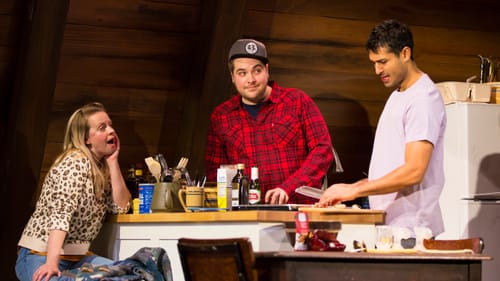Stay in the Loop
BSR publishes on a weekly schedule, with an email newsletter every Wednesday and Thursday morning. There’s no paywall, and subscribing is always free.
A talk in the woods
McCarter Theatre Center presents Rachel Bonds’s ‘Goodnight Nobody’

Promotional materials for Goodnight Nobody, the latest world-premiere play from McCarter Theatre Center, compare the work to the NBC nighttime soap opera This Is Us. Personally, I think that description does playwright Rachel Bonds a disservice.
For one thing: whenever I watch This Is Us, I end up thinking to myself, why is Milo Ventimiglia the only one who gets to die? This show would be so much better if all these vapid, annoying people kicked the bucket. In contrast, I never once wished for the demise of the five characters onstage in Princeton.
A thrilling opener
Bonds also possesses a gift for naturalistic dialogue that manages to be poetic in its unobtrusiveness and that lucidly builds relationships between the individuals in the play’s orbit. When Goodnight Nobody is at its best—which it is for about half of its running time—it creates a compelling world full of compassionate, interesting, and broken people who can’t seem to get out of their own way.
Stylistically, the language and tone resemble the expressively spare quality of contemporary playwrights like Annie Baker and Anne Washburn, while the overall sense of slice-of-life tragicomedy harkens unmistakably back to Chekhov.
Take the thrilling first scene, staged with a wellspring of moody subtext by Tyne Rafaeli. In a rustic cabin in Upstate New York—rendered with such specificity by scenic designer Kimie Nishikawa that it practically becomes another personality onstage—Nan (Saamer Usmani), a rising visual artist, and Mara (Dana Delany), a legend in the same field, consummate their fledgling attraction. The writing offers little in the way of seismic revelation, but the characters (and the actors playing them) find ways to infuse banality and silence with tension and chemistry.
Welcome to the woods
It is not explicitly revealed, for example, that Mara is the mother of Nan’s longtime friend Reggie (Nate Miller), now a roaddog stand-up comedian living in Los Angeles. Nor is it stated that Mara is nominally seeing Bo (an excellent Ken Marks), a more age-appropriate member of their artistic circle. Yet the pair project a sense of guilt over their unavoidable collision that suggests their relationship, however natural and pure it might feel to them, has the potential to hurt others in their orbit. Delany, a veteran of stage and screen, and Usmani, an actor previously unknown to me, are superb in conveying an air of simultaneous solicitude and nonchalance.
The play as a whole doesn’t always maintain the high stakes of its first scene. Where Bonds could benefit from the world of television writing is in that genre’s airtight plotting—that is, if she wants Goodnight Nobody to be a traditional work of narrative theater. That often seems the case, especially after the introduction of Reggie and K (Ariel Woodiwiss), another member of their high-school clique, who arrive with Nan to spend a slightly debauched weekend at the cabin.
This gathering comprises the meat of the script, and Bonds drops hints of revelations to come that are never fully realized. Nate drinks too much and casually suggests an impasse in his career, while K, a new mother, references the difficulties of balancing parenthood and home life. Nan’s mental health is questionable, and Bo, who arrives unexpectedly with Mara, seems to have a fair amount of tragedy in his past.

Tone poem or narrative?
Yet with the exception of K, who is given an expressive monologue about the simultaneous joys and indignities of motherhood, no character retains the focus of attention long enough to see these potential plot threads through to their logical conclusion.
That would be fine, too, if Bonds’s goal for Goodnight Nobody is a speculative, tone-poem type of drama, where setting and maintaining a mood is the ultimate objective. In this respect, I was often reminded of Baker’s John and The Flick, where nothing much happens, but somehow an entire world is created out of nothing. Jen Schriever’s chiaroscurist lighting and Daniel Kluger’s eerily woodsy sound design also recall Will Arbery’s recent Heroes of the Fourth Turning, another play where atmosphere is as important as plot.
Still, whenever Bonds seems to be taking the characters in the direction of pure mood, she eventually pivots back to suggesting a narrative disclosure that ultimately doesn’t materialize. Despite top-notch acting and production values that basically put the audience in that cabin in the woods, this becomes understandably frustrating.
What’s the story?
The foundation for Goodnight Nobody to become a successful play is already in place. It’s already leagues more compelling than This Is Us. Bonds just needs to decide what kind of story she wants to tell.
I hope she’ll treat this McCarter production as a very expensive, very accomplished workshop, then go back to the drawing board and figure out what she really wants the play to be about.
What, When, Where
Goodnight Nobody. By Rachel Bonds. Directed by Tyne Rafaeli. Through February 9, 2020, at McCarter Theatre Center, 91 University Place, Princeton, NJ. (609) 258-2787 or mccarter.org.
McCarter Theatre Center is a barrier-free building. There will be an open-captioned performance of Goodnight Nobody on Saturday, February 1, at 2pm, and an audio-described and ASL-interpreted performance on Saturday, February 8, at 2pm.
Sign up for our newsletter
All of the week's new articles, all in one place. Sign up for the free weekly BSR newsletters, and don't miss a conversation.

 Cameron Kelsall
Cameron Kelsall